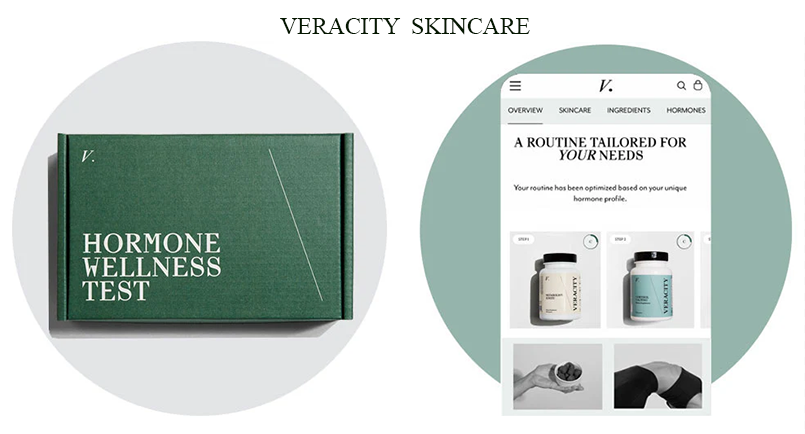
As we age, the body’s natural hormone levels shift, often causing a range of changes—especially in the skin. Hormone Replacement Therapy (HRT) is frequently used to address the hormonal declines that come with menopause, helping with symptoms like hot flashes, mood swings, and sleep disturbances. But HRT also plays a significant role in how our skin ages.
Contents
What is Hormone Replacement Therapy (HRT)?
Hormone Replacement Therapy is a treatment that supplements the body with hormones, typically estrogen and progesterone, to balance the decline experienced during menopause. While HRT is most often used to alleviate menopausal symptoms, its effects on skin health are a welcome side benefit for many women. By replacing estrogen, HRT can help restore some youthful qualities to the skin, including elasticity, moisture, and smoothness.
Types of HRT
- Estrogen Therapy (ET): Estrogen-only therapy is usually prescribed for women who have had a hysterectomy.
- Combination Therapy (EPT): Estrogen combined with progesterone is prescribed for women who still have their uterus to reduce the risk of endometrial cancer.
Let’s dive into how these therapies interact with the skin and the specific benefits HRT offers to aging skin.
Estrogen’s Role in Skin Health
Estrogen is one of the key hormones that influence skin structure and function. It affects collagen production, moisture retention, and skin thickness. As estrogen levels decline with age, so do these skin-supporting elements, leading to thinner, drier, and less resilient skin. HRT, particularly when it includes estrogen, can help mitigate some of these effects.
Boosting Collagen Production
Collagen is the protein that gives skin its structure and firmness. After menopause, collagen production decreases rapidly—some studies suggest up to a 30% decline within the first five years. HRT can help stimulate collagen production, which helps maintain skin thickness and reduces the appearance of fine lines and wrinkles.
Improving Skin Elasticity
Elasticity is what gives skin its “bounce-back” quality. Estrogen enhances skin elasticity by supporting elastin fibers, which allow the skin to stretch and return to its original shape. Without enough estrogen, these fibers weaken, causing skin to sag. HRT can help maintain skin’s elasticity, slowing down the visible signs of aging like drooping and wrinkling.
Enhancing Skin Hydration
One of the noticeable changes with menopause is dry skin. Estrogen helps the skin retain moisture by supporting the production of natural oils and strengthening the skin’s barrier. HRT can improve hydration, giving skin a plumper, smoother appearance. This effect can be especially beneficial for those experiencing excessive dryness as they age.
How HRT Impacts Different Layers of the Skin
HRT influences not only the surface but also the deeper layers of the skin, each playing a unique role in maintaining skin health and appearance. Let’s break down these layers and how HRT impacts each one.
The Epidermis
The epidermis is the skin’s outer layer, responsible for protecting against environmental damage and moisture loss. Estrogen helps maintain a healthy epidermal barrier, allowing the skin to lock in moisture and stay hydrated. HRT can enhance this protective barrier, reducing dryness and improving skin texture.
The Dermis
The dermis, located beneath the epidermis, contains collagen and elastin, which provide structure and elasticity. HRT has been shown to improve collagen density in the dermis, resulting in thicker, firmer skin. This improvement is what gives skin a fuller, more youthful look.
The Subcutaneous Layer
The deepest layer of the skin, the subcutaneous layer, contains fat that cushions and supports the other layers. Estrogen helps maintain this layer’s volume, which can diminish with age. By preserving this layer, HRT helps to maintain facial contours, reducing the hollowing effect that often comes with age.
Potential Side Effects of HRT on Skin
While HRT can bring many benefits, it’s important to be aware of potential side effects related to skin. Not every individual responds the same way, and some may experience skin-related side effects from HRT.
Hyperpigmentation
For some people, HRT can lead to hyperpigmentation, particularly melasma. Melasma is a skin condition that causes dark patches, often on the face, triggered by hormonal changes. If hyperpigmentation occurs, using broad-spectrum sunscreen daily and incorporating brightening ingredients like vitamin C can help manage it.
Increased Oiliness or Acne
Estrogen typically reduces sebum (oil) production, but in some cases, the hormonal changes from HRT may trigger oiliness or acne. This effect is more common in those prone to hormonal acne. A gentle skincare routine and oil-balancing ingredients like niacinamide or salicylic acid can help keep oil production in check.
Enhancing Skin Health with HRT: Practical Tips
While HRT can positively impact skin aging, supporting these effects with a solid skincare routine and healthy lifestyle habits can further maximize skin health.
Consistent Sun Protection
Sunscreen is your best defense against premature aging. While HRT may improve skin thickness and collagen, UV rays still break down these essential proteins. Choose a broad-spectrum SPF 30 or higher to protect your skin every day.
Supportive Skincare Ingredients
- Retinoids: These Vitamin A derivatives help stimulate collagen production and improve skin texture.
- Peptides: Peptides support collagen and elastin, giving the skin a firmer look.
- Hyaluronic Acid: This ingredient draws moisture into the skin, working alongside HRT to improve hydration.
Incorporating these ingredients into your skincare routine can amplify the benefits of HRT, especially when it comes to maintaining skin firmness and hydration.
Healthy Lifestyle Choices
Hormones are sensitive to lifestyle factors, including diet, sleep, and stress. Eating antioxidant-rich foods, getting regular exercise, and managing stress can all contribute to balanced hormone levels, complementing the effects of HRT on the skin. Staying hydrated and avoiding smoking are also key steps for supporting skin health during HRT.
When to Talk to a Professional About HRT
While HRT can bring numerous benefits, it’s not suitable for everyone. Consulting with a healthcare provider can help determine whether HRT is a good option for you, especially if skin aging is a primary concern. They can discuss the types of HRT available, along with potential risks and benefits, to help you make an informed decision.
If HRT isn’t suitable, there are alternative treatments, such as topical estrogens and non-hormonal skincare products, that may offer similar skin benefits without the risks associated with systemic HRT.

